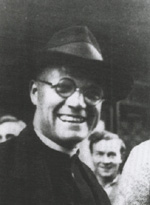December
2013/January 2014 - Vol. 71
.
Aim
at Heaven with All
Your
Strength
Excerpted
from Alfred Delp's prison
meditation
on the Lord's Prayer
The God of life is a personal God and only when man enters into the
dialogue with him does he begin to realize his dreams. In this conversation
he learns the fundamental principles of his being-adoration, veneration,
love, trust. Anything undertaken on a plane lower than this dialogue, no
matter how much zeal and sincerity and devotion go into it, is in the end
incomplete. Adoration is the road that leads man to himself.
The realm of the personal God is heaven, that is to say it is the sum-total
of all that man considers to be his life's greatest happiness. Fulfillment
and more. It is not primarily a place or a period of time or anything like
that. It is fundamentally God himself - a conscious union with him. Anyone
who has achieved that union is in heaven. It is a union that uproots all
our limitations and destroys our previous habits if we are fortunate enough
to begin to experience it here on earth. The records of the world's great
mystics that have come down to us witness this. But for most of us the
breaking up of our present form of our existence, that is our death, is
the usual gateway to God. On that plane things merge into each other; the
things a man loves or longs for, happiness, joy, heaven, and the things
he reverently praises, God and his fullness are brought to one focus.
Love of heavenly things is something the Church often prays for
as the summit of grace and fulfillment. It is important to throw a bridge
across to fulfillment, to the future, to that which is hoped for not only
as far as the desires of our nature go but also 8S far as our attitude
and conscious effort are concerned.
We must aim at heaven with all our strength. Man will have to re-learn,
much more positively and intensively than before, that life leads from
the personal dialogue with God to the actual personal encounter and the
experience of unity with God. He will have to learn that this is his heaven
and his real, his only, home. Then he will learn to pray, not merely as
a duty and in obedience, but with intense vitality and with all the driving
force of his own free will.
Go
to next meditation > I
Must Take the Other Road
Return to Joy
in the Face of Death - Alfred Delp S.J., by Jeanne Kun, with excerpts
from the book, Even Unto Death: Wisdom from Modern Martyrs, edited by
Jeanne Kun, The Word Among Us Press, © 2002. All rights reserved.
Used with permission. The book can be ordered from WAU
Press. |

A selection of meditations
from prison
written by Alfred
Delp
>
The
People of Advent
>
True
Happiness
>
God
Alone Suffices
>
The
name Jesus
>
No
Death Can Kill Us
>
Aim
at Heaven with All your Strength
>
I
Must Take the Other Road
Alfred
Delp was a German member of the Society of Jesus, who was executed for
his resistance to the Nazi regime.
Alfred
Delp was born in Mannheim, Germany, to a Catholic mother and a Protestant
father. Although baptized Catholic, he was raised and confirmed a Lutheran.
At the age of 14 he left the Lutheran church and was confirmed as a Roman
Catholic. In his later life Delp was a fervent promoter of better relations
between the churches.
Delp
joined the Jesuits in 1926. In the next 10 years he continued his studies
and worked with German youth, made more difficult after 1933 with the interference
of the Nazi regime. Delp was ordained in 1937.
Unable
for political reasons to continue his studies, Delp worked on the editorial
staff of the Jesuit publication Stimmen der Zeit (Voice of the Times),
until it was suppressed in 1941. He then was assigned as rector of St.
Georg Church in Munich. Delp secretly used his position to help Jews escape
to Switzerland.
Concerned
with the future of Germany, Delp joined the Kreisau Circle, a group that
worked to design a new social order. He was arrested with other members
of the circle after the attempted assassination of Hitler in 1944. After
suffering brutal treatment and torture, Delp was brought to trial. While
he knew nothing of the attempted assassination, the Gestapo decided to
hang him for high treason.
Delp
was offered his freedom if he would renounce the Jesuits. He refused and
was hanged February 2, 1945. His body was cremated and his ashes spread
on an unknown field.
While
his physical remains disappeared, Alfred Delp left behind letters smuggled
out of prison. They reveal a man of courage who told the prison chaplain
accompanying him to his death, “In half an hour, I’ll know more than you
do.”
[biographical
source: IgnatianSpirituality.com]
[Selection from The Prison Meditations of Father
Alfred Delp, with an Introduction by Thomas Merton (New York: Herder
and Herder, 1963)] |